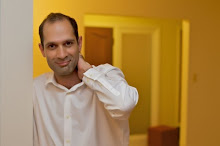Noreena Hertz presented an excellent Ted talk on what the consequence is of trusting "experts".
A few interesting points:
1. It has been shown that decision-making centres in the brain are "switched off" when experts are being listened to
2. Experts are not infallible. Yet there is a growing market of trust in experts (that's why law, medicine, financial advice or any profession with specialized knowledge are growing industries)
3. Actively manage dissent. Welcome dissent and recognize the value of disagreement
4. Democratize expertise, for example, as Miss Hertz suggests, using Prediction Markets, like Best Buy does.
I was previously involved in a startup company that supplied technology similar to that used by Best Buy in "democratizing" expertise to make key decisions. The theory was: a shipping clerk is sometimes party to very key information ("the word on the street") that certain VPs might not be - a method of him contributing this information and this information being aggregated would lead to more reliable forecasts.
While I am equally afraid as Miss Hertz is of putting trust in experts, I would like to suggest an additional factor that might improve one's risk in putting trust in experts: how much skin do they have in the game?
I have benefited from the best medical advice in my life from my very own father, who, knowing I was sick, made it a point to call me on the other side of the world and never stopped asking questions, in a desperate bid to eliminate conditions that he was aware of. The questions continued months after, sometimes years after I was healed. And then I realized why: I was his son, and he had a big stake in my health.
Malpractice insurance, legal indemnity, "past performance is not an indicator of future performance" and a general "I'll give it my best shot, but I don't promise anything" have made it all too easy for professionals to become complacent. I have never heard of a young University graduate fearing going to Law school for the consequences of him sending an innocent man to death row or a doctor fearing becoming a doctor because the consequences of a misdiagnosis would be on his conscience.
My point is that incentives have become increasingly skewed, but the expert titles increasingly valuable (which means that demand for experts has consistently outstripped supply). People have consequently become a lot more trusting and are willing to trade risk for money that they pay the experts. It should be the other way round!
Next time you choose a professional, don't look at his academic, business or other qualifications as hard as you look at his references. When had this person failed, and how did he treat that failure? Does this person actively seek to earn your trust, by demonstrating that a loss for you will be a loss for her? Will this person care about the consequences of the advice he gives, much like Noreena Hertz cared about the consequences of her father drinking a large amount of water?
Friday, March 4, 2011
Subscribe to:
Post Comments (Atom)


No comments:
Post a Comment